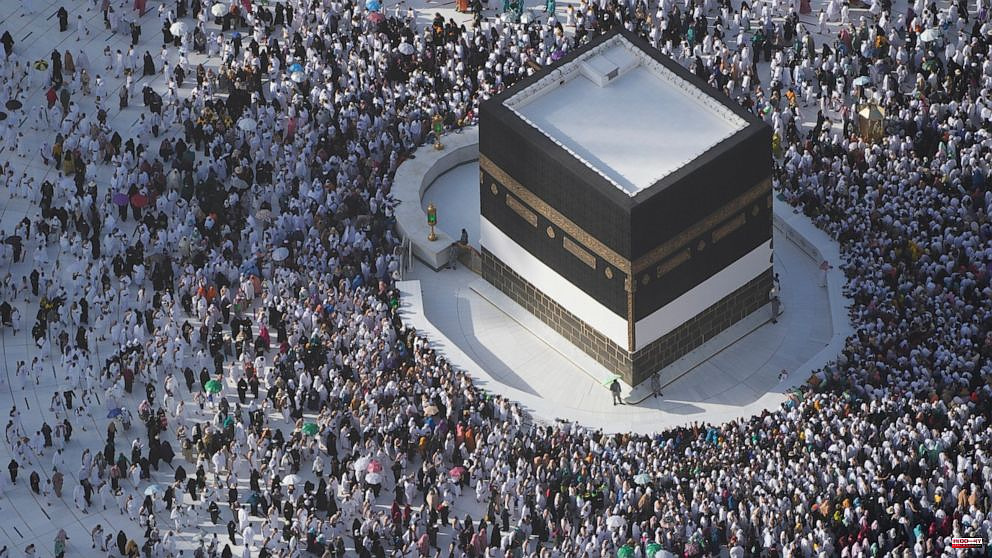MECCA, Saudi Arabia -- This scene stirs hope and relief for Muslims all over the world.
One million pilgrims from all over the world gathered in Mecca, Saudi Arabia on Thursday to perform the first rites for the hajj. This was the largest Islamic pilgrimage since the outbreak of coronavirus -- an important pillar of Islam -- ended the annual event.
For all Muslims financially and physically able, the hajj is an once-in-a lifetime obligation. It takes Muslims along the same path that the Prophet Muhammad used 1,400 years ago. Five days of rituals are performed by pilgrims to help them get closer to God.
This includes praying in the Kaaba (cube-shaped), which is the holiest shrine of Islam. On Thursday, thousands of pilgrims unmasked circled the Kaaba in the Grand Mosque's courtyard.
Visibly thinner than usual, the crowds moved in a blur around the granite building, with their hearts tilted toward the structure that symbolizes the Oneness of God in Islam. Every day, Muslims who observe Islam face the Kaaba regardless of where they may be in the world to pray.
As they invaded the Grand Mosque, Pilgrims seemed to be ignoring COVID-19 warnings -- in stark contrast to the mask-requirements and social distancing of the previous two years.
Mohammad Qabbani from Sudan, who said, "This year, the number of pilgrims has been enormous, thank God," "There are not many COVID-19 cases." It is a good situation."
There were signs of vigilance. In the past, worshippers would fight the crowds to get a chance at touching and kissing the Kaaba's black stone in the eastern corner. But the government has banned this practice for the third consecutive year. Saudi authorities distributed water bottles from the holy Zamzam well to pilgrims instead of allowing them to drink from cups at mosque. Many thousands of medical professionals were available to help those in need.
Only 1 million pilgrims from abroad and the home are allowed to participate in the hajj this year. They must have been fully vaccinated against coronavirus and tested negative for COVID-19, and be between 18 and 65 years of age. According to authorities, 85% of the pilgrims have come from overseas.
Although this year's attendance was far lower than the 2.5 million pilgrims who arrived in the country before the pandemic, it is still a significant step towards normal. The kingdom has restricted access to the event to a few Muslim residents over the past two years.
In 2020, only 1,000 Saudi Arabian residents were allowed to participate in the ritual. It was nearly scrapped entirely. Last year, approximately 60,000 people attended. These unprecedented restrictions shocked the Muslim world, and many believers were devastated. Many have saved for years and waited years to make the pilgrimage.
Although this hajj is not taking place in the shadows of the pandemics, it takes place amid Russia's war against Ukraine. This conflict may be thousands miles away from many Muslims' homes but has caused the prices for staple foods to soar and spread misery around the globe.
The latest efforts of Crown Prince Mohammed bin Salman, de facto ruler, to ease social restrictions and transform the Kingdom are also highlighted at this year's Hajj. Saudi Arabia allowed women to perform the hajj last year without the need for a male guardian (or "mahram")
The hajj is a Muslim ritual that unites Muslims and acts as a powerful equalizer. Pilgrims are known for wearing simple clothing. For men, it is common to wear a white draping outfit, while for women, a conservative dress and headscarves is worn. This allows them to draw closer to God.
Even Mecca can't escape the worlds wealth gap: Five-star hotels overlooking Kaaba may cost upwards of $3,000 per night to the well-off. Most pilgrims will opt to stay in basic accommodations, or even on the ground near the mosque, for daily prayers before the hajj.
Saudi Arabia controls the flow of pilgrims because there are more applicants each year for the hajj than the kingdom can handle. This is done through annual quotas that are based on the Muslim population of each country.
After recent tragic events, the visa regulations have become more stringent. A stampede claimed the lives of several thousand pilgrims in 2015 These quotas were drastically reduced in 2015. The largest contingent in the world, Indonesia sent just over 100,000 people. The United States sent more than 9,500 people.
Iran, the Shiite powerhouse and Saudi Arabia's regional foe, barred its citizens from making pilgrimage in 2016. This was amid escalating sectarian conflict. It sent 39,000 worshippers in 2016, less than half its 2019 attendance. Iranian media reported that the special envoy for hajj, Ayatollah Ayatollah Al Khamenei, was not granted a visa as he is older than 65.
The hajj officials of the two countries met last month to discuss how tensions between them had eased amid regional negotiations and the cease-fire in Yemen.
The government is happy with the increase in infections, even though the pandemic is not over. There are hundreds of new infections every day in the Kingdom. This event is crucial for Saudi Arabia's prestige and tourism.
On Thursday evening, the majority of pilgrims arrived in Mina, an easterly village east of Mecca. There they will spend the night at a sprawling tent town, divided according to their origins. They will march to Mount Arafat on Friday morning to ask forgiveness for their sins.
----
DeBre reported out of Dubai, United Arab Emirates.












